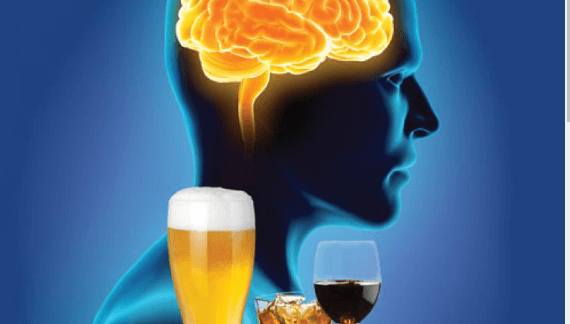Alcohol and Brain Function: A Comprehensive Review

Picture this: you are out with your friends and agree to take the same drink in rounds. That sounds like a good idea. You agree to the first round, share stories, laugh, and then the second. You remember telling them you are done by the fourth, but you don’t remember anything else.
That is what is generally called a blackout. Many people who drink alcohol in large quantities have experienced blackouts when the brain shuts down to deal with the copious amount of alcohol they have consumed.
A blackout isn’t the only effect alcohol has on your brain. There are many other ways, and we will review all these effects below.
The Chemistry of Alcohol
Alcohol is a shorter name given to the typical chemical in all alcoholic drinks: ethyl alcohol.
Alcohol can exist naturally under certain conditions, but the one consumed as a beverage and in drinks is made by humans. The process involves fermenting sugars from grains, fruits, and vegetables using yeast. Yeast is a fungus that breaks down sugars releasing alcohol and other by-products.
Alcohol might seem like the new rave in modern times or look like a by-product of industrialization, but the reality is far from both. There are records of alcoholic drinks dating as far back as 7000 BC in China and India.
You might think all alcoholic drinks are the same, but they aren’t and might have varying effects on the body. One thing to remember is that alcohol is never distributed in its purest form. There is always a level of dilution, and the higher the dilution, the lesser the effects of the drink.
For example, it will take longer for a person to get intoxicated by wine, rated as 5%, than wine at 20%.
Alcohol and Brain Function
Most effects of alcohol are reactions between it and the human brain, so there is a link between alcohol and brain health. Alcohol can pass through the blood-brain barrier, a gate between the brain and the rest of the body. Since alcohol can pass this gate, it interacts uniquely with the brain.
So what are the effects of alcohol on the brain at different stages of its development? Let’s find out.
Alcohol and the Fetal Brain
You would think that alcohol only goes to the brain, liver, and out through the kidneys, but you would be wrong. It can pass through most membranes which include the brain Function. When a pregnant woman takes alcohol, she exposes her unborn child to its effects.
When a fetus has been exposed to large or constant amounts of alcohol, it develops Fetal Alcohol Spectrum Disorder.
This disorder refers to alcohol’s effects on all parts of the unborn child but is most noticeable in the brain after birth.
First, the child struggles in speech development. The brain is responsible for gathering and processing all the information a child will need to function, and speech is an integral part of it. Alcohol can delay or permanently affect a child’s speech development.
Alcohol intake while pregnant can adversely influence the child’s learning ability. The child might struggle to understand concepts appropriate for their age.
There is also a higher risk of the child developing mental disorders like depression and Brain Function.
Finally, the child is more likely to abuse alcohol and other substances when older because of the altered brain chemistry before birth.
Alcohol and the Adolescent Brain
Adolescents might be as big or even more significant than many adults, but they are more vulnerable to the effects of alcohol than they are.
First, there is still development in an adolescent’s brain, and alcohol can interfere with that. A teenager can lose the ability to process complex information with continued drinking.
Adolescence is when individuals learn the most, and alcohol can affect concentration and impair learning. Alcohol affects concentration and impairs memory, two things needed in education.
Alcohol can also affect moods and make teenagers susceptible to mental and personality disorders. There is a higher chance of developing alcohol abuse problems later in life the earlier a person starts drinking.
Effects of Alcohol on Adult Brain Function
Adults are different, which also refers to how well our bodies process alcohol. So, what might be a safe amount of alcohol for someone might be excessive for others. However, no matter how little alcohol we consume, our brain matter is affected. These effects can be short-term or long-term.
Short-term effects include altered judgment. The more you take alcohol, the more you become open-minded to things you wouldn’t accept if you weren’t intoxicated. You misjudge everything, including distance, so complex tasks can be difficult.
Other short-term effects include memory loss, mood changes, and slurred speech. All these things happen because alcohol inhibits parts of your brain, preventing them from functioning as they should.
These effects are short-term because they are easily reversible when you stop drinking.
Long-term effects, on the other hand, require particular interventions in most cases. These effects include brain injury and damage caused by consuming enough alcohol to change your brain chemistry permanently.
Another effect of alcohol on our brains is on our dendrites, which are the spider-like tails of our neurons. Permanent damage to these cells affects how well our brain transfers information between its parts.
General changes to perception, moods, judgment and even brain size exist. These effects and more are how alcohol impacts your brain.
Conclusion
Alcohol consumption can directly alter your brain’s health; without your brain operating optimally, your life won’t be the best it can be.
However, there is a way to reduce the effects of alcohol on your brain, mindful drinking. Mindful drinking means you are conscious of the amount, time, and type of alcohol you consume.
It might sound like a lot of work, but Sunnyside is here to help you. We have apps, counselors, and materials to guide you to better brain health. With us, your drinking goals aren’t impossible, and if you fall off track, we are here to get you back on track.




